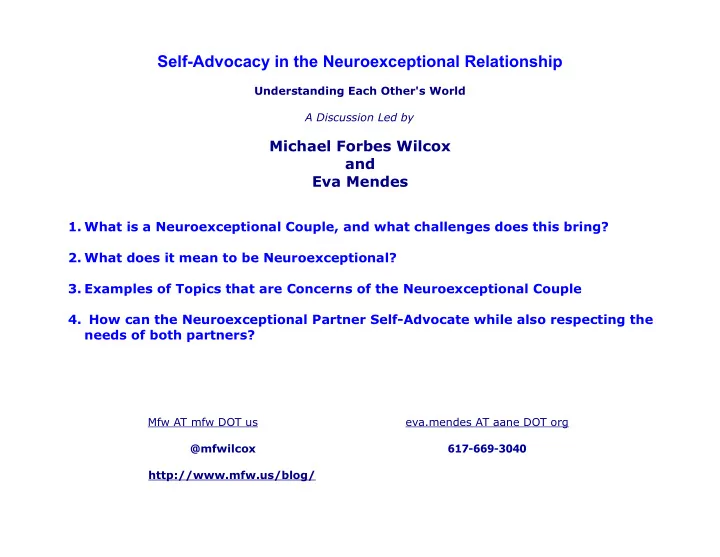

Self-Advocacy in the Neuroexceptional Relationship Understanding Each Other's World A Discussion Led by Michael Forbes Wilcox and Eva Mendes 1. What is a Neuroexceptional Couple, and what challenges does this bring? 2. What does it mean to be Neuroexceptional? 3. Examples of Topics that are Concerns of the Neuroexceptional Couple 4. How can the Neuroexceptional Partner Self-Advocate while also respecting the needs of both partners? Mfw AT mfw DOT us eva.mendes AT aane DOT org @mfwilcox 617-669-3040 http://www.mfw.us/blog/
What is a Neuroexceptional Couple, and what challenges does this bring? One or both partners not neurotypical Typically, a heterosexual couple; woman = neurotypical, man = Asperger's clinical diagnosis self-diagnosis wife-diagnosis Sometimes, both are autistic; some are same-gender relationships Neurotypical partner = “spouse” Spouse alienated and lonely; disconnected, socially isolated Communication often difficult; frequent misunderstandings Neuroexceptional partner; mood swings, meltdowns, pessimism, paranoia, defensiveness, rigidity; overblown sense of correctness; need for perfection Spouse often experiences a lack of empathy from their partner, who has difficulty experiencing or expressing emotions (called alexithymia )
What does it mean to be Neuroexceptional? Two types of brains (1) Typical ( neurotypical ) (2) Atypical ( neuroexceptional ) including but not limited to: Autism Dyslexia Severe Depression Bipolar Schizophrenia Communication between Neurotypical & Neuroexceptional people = “Ships passing in the night...” Differences include Literal thinking Social cognition: awareness, comfort, involvement Sensory integration Cognitive styles (language versus concepts) and pattern recognition Speed of processing (e.g. auditory processing, working memory) Caveat! Not universal, dangerous to overgeneralize
How can the Neuroexceptional Partner Self-Advocate while also respecting the needs of both partners? Prerequisites : Self-awareness (“Know Yourself”) Self-acceptance Desire for pragmatic change Mindfulness Mirroring Meditation Emotional Regulation Cognitive Behavioral Therapy and other neurally-inspired therapeutic approaches that address conscious behavioral adaptations. Support Groups – sponsored by AANE and Community Resources Easthampton (Western Mass, Connecticut, New York) Contact Trish Huff: trishaane@comcast.net or 413-219-3464 Watertown (Greater Boston Area) Contact Eva Mendes or Grace Myhill, LICSW : gmyhill@gmail.com www.gmyhill.com 617-504-3116
Examples of Topics that are Concerns of the Neuroexceptional Couple Social/Family Interaction Not feeling connected (Spouse); How to Connect (Partner) What can and should be changed? And what must simply be accepted? Eye Contact Sensory Overload Monologuing Improving pragmatic communication? Sharing emotional experiences (in both directions) Receptive Empathy Expressive Empathy Balancing mutual versus individual activities What hope is there for change in the neuroexceptional person? Neuroplasticity
Bonus Trivia Quiz: Who Was This Person? “I am slow to learn and slow to forget that which I have learned. My mind is like a piece of steel; very hard to scratch anything on it and almost impossible after you get it there to rub it out.” "...possessed extraordinary empathy - the gift or curse of putting himself in the place of another, to experience what they were feeling, to understand their motives and desires." “Although a profound analyzer of the laws of human nature he could form no just construction of the motives of the particular individual. “He could not distinguish between the paleness of anger and the crimson tint of modesty. In determining what each play of the features indicated he was pitiably weak."
Recommend
More recommend